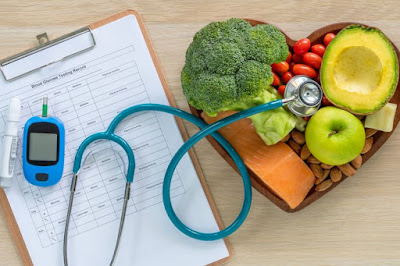Label
Gambar ilustrasi buah-buahan segar. Buah-buahan merupakan sumber makanan yang kaya akan vitamin, mineral, serat, dan antioksidan. Mereka juga rendah kalori dan kaya akan air, yang membuatnya menjadi pilihan yang baik untuk ditambahkan dalam diet sehari-hari. Dalam artikel ini, kami akan menjelaskan manfaat kesehatan yang dapat diperoleh dari mengonsumsi buah-buahan secara teratur dan jenis-jenis buah yang baik untuk kesehatan. Manfaat Buah-buahan untuk Kesehatan Mengandung Vitamin dan Mineral Buah-buahan mengandung beragam jenis vitamin dan mineral, seperti vitamin C, vitamin A, vitamin B, kalium, kalsium, dan zat besi. Vitamin C dan A dapat membantu menjaga kesehatan kulit, mata, dan sistem imun. Sementara, kalium dapat membantu mengontrol tekanan darah dan menjaga kesehatan jantung. Mencegah Penyakit Kardiovaskular Buah-buahan yang kaya akan serat, vitamin C, dan flavonoid dapat membantu mencegah penyakit jantung dan stroke. Beberapa jenis buah, seperti stroberi, blue...
5 Cara Mudah untuk Menurunkan Kolesterol Anda
Ilustrasi sayur untuk menurunkan kolesterol tinggi, makanan untuk menurunkan kolesterol tinggi. (Shutterstock/Chinnapong) Kolesterol adalah zat lemak yang ditemukan dalam darah kita dan diperlukan untuk memproduksi hormon, vitamin D, dan enzim. Namun, kadar kolesterol yang tinggi dapat meningkatkan risiko penyakit jantung dan stroke. Berikut adalah 5 cara mudah untuk menurunkan kadar kolesterol Anda: Ganti makanan yang tinggi lemak jenuh dengan bahan nabati. Lemak jenuh yang terkandung dalam makanan seperti daging merah, telur, susu full cream, dan makanan olahan dapat meningkatkan kadar kolesterol dalam darah. Gantikan dengan bahan nabati seperti kacang-kacangan, biji-bijian, dan sayuran. Kurangi konsumsi garam. Garam dapat meningkatkan tekanan darah, yang dapat meningkatkan risiko penyakit jantung. Hindari makanan olahan yang tinggi garam dan gunakan rempah-rempah sebagai pengganti. Olahraga secara teratur. Olahraga secara teratur dapat menurunkan kadar kolesterol dalam darah dan men...
Menjaga Kesehatan Ibu dan Anak: Panduan Lengkap dari Kehamilan hingga Persalinan
"Gambar Ilustrasi Ibu hamil dengan dokter yang memberikan konsultasi kesehatan. ( Istockphoto/ Srisakorn)" Menjadi ibu adalah salah satu peran yang paling penting dalam kehidupan. Namun, menjalani proses kehamilan, persalinan, dan merawat bayi baru lahir dapat menjadi hal yang menantang. Oleh karena itu, penting untuk mempersiapkan diri sebaik mungkin dan mengetahui informasi yang dibutuhkan untuk menjaga kesehatan ibu dan anak. Persiapan Kehamilan Sebelum merencanakan kehamilan, sebaiknya konsultasikan dengan dokter untuk memastikan kondisi kesehatan Anda dan pasangan Anda dalam keadaan baik. Dokter akan memberikan saran dan rekomendasi yang dibutuhkan untuk menjaga kesehatan selama kehamilan. Selain itu, perhatikan asupan nutrisi Anda. Kebutuhan nutrisi ibu hamil berbeda dengan orang yang tidak hamil, sehingga perlu mengonsumsi makanan yang kaya akan zat gizi seperti protein, kalsium, folat, dan lain-lain. Jangan lupa untuk mengonsumsi vitamin dan suplemen yang dianju...




